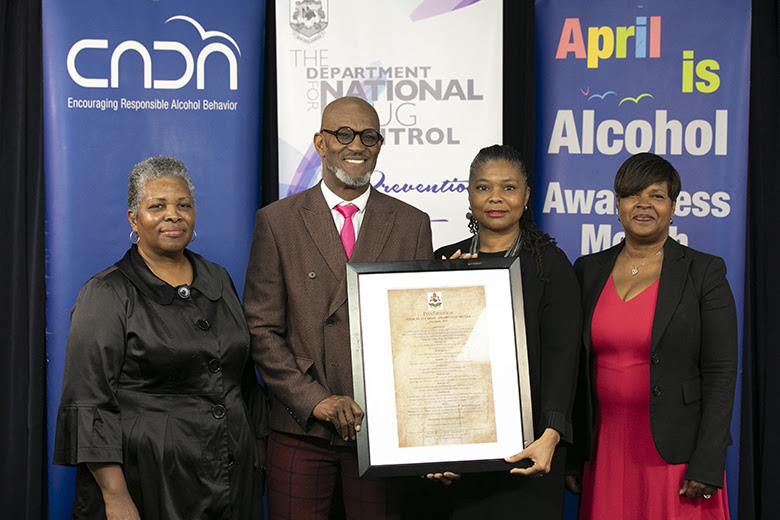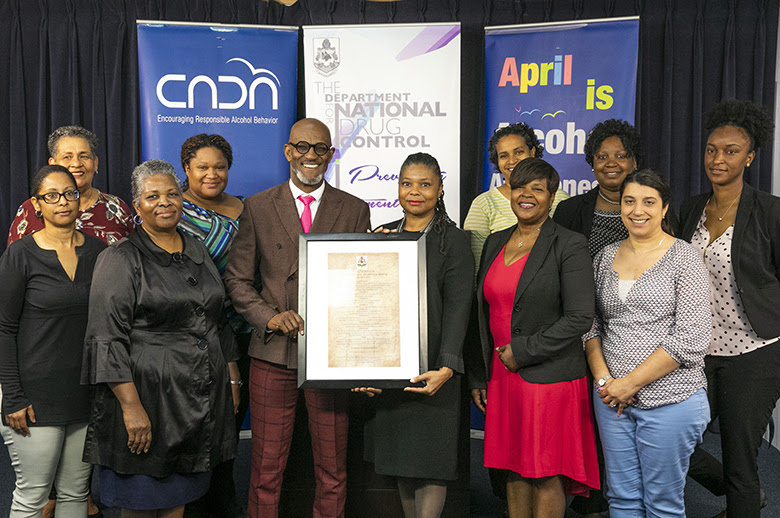April Is Recognised As Alcohol Awareness Month
Attorney General and Minister of Legal Affairs, Senator Kathy Simmons was joined by Executive Director of CADA Anthony Santucci this morning [April 1] to recognise Alcohol Awareness Month.
This year’s theme is ‘Help for Today, Hope for Tomorrow’.
Attorney General Simmons remarks:
Attorney General Simmons said, “Today, Bermuda joins the US National Council on Alcoholism and Drug Dependence, Inc. who have recognized April as Alcohol Awareness month for the past three decades [1987].
“This year’s theme, ‘Help for Today, Hope for Tomorrow’, speaks to educating people about the prevention and treatment of alcohol addiction, particularly amongst our youth, and the important role that parents can play in giving children a better understanding of the impact that alcohol can have on their lives. Evidence regarding alcohol use from the US National Institute of Health is very clear:
“Drinking too much alcohol can take a heavy toll, not only on a person’s health but also on his or her family relationships and work or school performance. Alcohol consumption can lead to alcohol dependence and abuse, contribute to a number of diseases and mental and behavioral disorders, and may lead to a range of injuries.”
Truell Landy, Executive Director PRIDE Bermuda; Minister of Legal Affairs, Senator Kim Simmons, JP; Joanne Dean, Director of Department of National Drug Control; Anthony Santucci, Executive Director CADA
“Reports from Bermuda’s Department of National Drug Control 2015 National School Survey, which monitors the prevalence of alcohol, tobacco and other drug use among our young people, revealed that the lifetime prevalence of alcohol use for students from years M2 through to S4 is 52.6% – just over half of our students.
“What does lifetime prevalence of alcohol use mean? It means those individuals who had reported that they had used alcohol, at least once, in their lifetime. 52% of our students had reported that they had used alcohol in their lifetime. The majority [36.6%] of lifetime users of alcohol, have reported recent use of alcohol which means use in the past 12 months.
“The survey also revealed that current use of alcohol was most prevalent among older students, with M2 [age 12] students representing 49% and S4 [age 17] students representing a high of 53%. Further, it was reported that 1 in 5 students [21%] had been asked to buy or use alcohol in 2015. These results are very concerning as alcohol use and abuse remains one of the greatest challenges facing Bermuda’s youth.
“Alcohol use by young people can be extremely dangerous. The Centre for Disease Control in the USA reported that of all the alcohol consumed by young people between the ages of 12-20 years, more than 90% of it is consumed through binge drinking. Binge drinkers are at risk for alcohol overdose and/or poisoning, vehicle accidents and unsafe sexual behaviours.
“Parents are the most important role models in their children’s lives. What parents say and do about drugs and alcohol does matter when it comes to the choices their children will make.
“Parents are urged to have those conversations with their children:
- Set a positive example and get involved in your children’s lives
- Get involved in their activities, know their friends and know where they are going and what they are doing
- Create clear, consistent expectations and enforce them
- Talk early and often about drugs and alcohol
- Discuss the consequences of drug and alcohol use
- Show you care enormously about what choices your children make about drugs and alcohol.
“During the month of April, the Department of National Drug Control Drug Prevention Unit will be hosting community education activities at sporting events and at the senior school level to create awareness and encourage our community to get educated about the harms associated with alcohol and to seek assistance for alcohol related problems. The Drug Prevention Unit also plans to conduct the National School Survey 2019 of Middle and Senior Schools on Alcohol, Tobacco, Other Drugs and Health in the latter part of this year.
Minister Kathy Simmons and DNDC team
“The Ministry of Legal Affairs, takes this opportunity to thank prevention organizations such as CADA and PRIDE who have been consistently disseminating prevention messages about the dangers of alcohol consumption and would like the public to know that the Department for National Drug Control has the resources necessary to help parents to begin the conversation with their children about drugs and alcohol.”
Executive Director of CADA Santucci remarks:
Mr. Santucci said, “Good Morning AG Simmons, Dr Shawnee Basden, Director Joanne Dean of the DNDC Members of the media and friends and supporters.
“Bermuda will join the National Council on Alcoholism and Drug Dependence, Inc. [NCADD] in celebrating April 2019’s alcohol awareness month. This is a time to increase public awareness and understanding, reduce stigma and encourage communities to focus on alcoholism and alcohol-related issues.
“CADA joins the Department for National Drug Control, Pride, and The Bermuda Coalition in recognizing the critical public health issues of alcoholism and its impact on young people and families.
“Help for Today, Hope for Tomorrow”
“Alcohol Awareness Month was established in 1987 to help reduce the stigma so often associated with alcohol addiction by encouraging communities to reach out to the Bermudian public each April with information about alcohol, alcohol addiction, and recovery. Alcohol addiction is a chronic, progressive disease, genetically predisposed and fatal if untreated. However, people can and do recover.
“Alcohol Awareness Month provides a focused opportunity across Bermuda to increase awareness and understanding of alcohol addiction, its causes, effective treatment, and recovery. It is an opportunity to decrease stigma and misunderstandings in order to dismantle the barriers to treatment and recovery, and thus make seeking help more readily available to those who suffer from this disease.
“During this call to action Parents need to know that progress is being made in the struggle to address underage drinking in our community. Research shows that kids who learn about the dangers of underage drinking from their parents are up 50% less likely to experiment than kids who don’t. So, help connect the dots for your kids about alcohol use – it’s worth it. To learn more about underage drinking go to www.cada.bm
Know Alcohol Day [April 26]
“CADA ask parents and other adults to learn more about alcohol and its effects, by visiting our website or any of the many resources available, online
April is Alcohol Awareness Month
“CADA would like to remind you that if drinking has caused problems in your relationships, at work, at home, financially, physically or legally, it may be time to get help.
“In Conclusion:
“Help for Today, Hope for Tomorrow”




We are all too aware of Alcohol.
…and the senior magistrate wants to help convicted drunk drivers avoid being banned from the roads, I can’t believe the coroner, who views the bodies of all our DUI fatalities thinks people who knowingly drive while drunk with no concern for the safety of others, need a break . Any comment from the agencies above? This island is a joke.
The law has determined that x amount of alcohol in a person’s blood makes them unsafe to operate motor vehicles. I think an alcohol court should exist, but I also believe in a ban in proportion to a person n,s gradual progress thru any program. While they participate in the pr ogram there should be no alcohol or a very very limited amount in their body and they should be required to be tested three times a week. Exactly what is a drinking problem anyway ,2 beers before 9 am , or 3 drinks between 4 and 7pm. Shall we next have a speeders court, some have a rush of andrenalin with speed.There are probably over three thousand alcoholics on our roads, occasional drinkers, heavy drinkers. There are folks where driving is their job, 8 hours a day, so if they get ticketed 4 times in a year they run the risk of bring disqualified should they amass 12 points in a year, is that fair ?? ? We need to look at reality for sure. Drunk driving must be challenged more often and severe penalties must apply to protect other road users.